“I’d think about going vegan but it’s too expensive.” How many times have we heard someone express a sentiment like this or imply that eating being vegan is just for the affluent? How often have we ourselves thought, “Well, I’m spending more now but I will make up for it with my lack of medical bills." (I hope.) Truth be told, it is more expensive to eat fresh, whole foods than to eat off of dollar menus — at least at the outset, because a diet high in animal products can be quite expensive to us down the road - but there are ways to cut that back while not sacrificing an emphasis on unprocessed, natural foods. Here are some simple but effective strategies for cutting back on your food expenses. Excerpted from this article on Vegan Street, where you'll find 10 additional strategies for being a frugal vegan!
Grow your own
For a few dollars per packet of seeds or a little more for seedlings, you can get exponentially more herbs and produce than you could for the same amount of money at the grocery store. While gardening does have some definite costs involved - like buying soil and other materials - it is also endlessly rewarding. If you don’t have a back yard, look into getting a plot at a community garden. In even a small amount of space, you’d be surprised by how much you can grow.
Keep a weekly menu and stick to a shopping list
This does take a little spontaneity and fun out of your grocery trips, but it can also take a big bite out of your weekly food bill and the amount of time you spend shopping in one fell swoop. This tip offers more bang for the buck than any of the others, in my opinion. Making a weekly menu and shopping list is really not that great a hardship: set aside an hour or so once a week (Sunday is my day), grab a bunch of cookbooks or look at recipe folder you’ve got going on your computer (you do this, right?), sip some tea and get to planning. Planning your meals and sticking to a grocery list means fewer impulse purchases (usually unnecessary conveniences), and as an added benefit, you can look at your diet over the course of a week and make sure it’s balanced. Last, keeping a list is a time management tool as well: not only can you organize your list by where it is at the store, thus have you in and out of the grocery store quicker, but you don’t have to scramble at the last minute to decide what to cook for dinner.
Keep track of coupons and sales
Keep track of coupons and sales through services like the Whole Foods weekly circular and Whole Deal two-month coupons, Delicious Living Magazine, Organic Deals coupons, Mambo Sprouts,Vegan Coupons, Vegan Cuts, and vegan deals on Retail Me Not. Of course, all except the exclusively vegan services must be sifted through to find the appropriate deals. Also, keep in mind that a deal is only a good deal if it's an item you want to buy: don't buy something you know you don't need just because there's a coupon. That's spending money you wouldn't have otherwise.
Buy in bulk
Find the local grocery stores that allow you to buy in bulk and do it! Grains, beans, baking supplies; all are less expensive without packaging and you can buy the amount you want.
DIY
Doing-it-yourself is the order of the day when it comes to saving money. It only makes sense that things cost more if you have someone else produce it. By making as much as you can on your own, you can keep better quality control over the ingredients as well and make things just to your liking. Things like salad dressings, marinades, breads and more generally cost less if you make them yourself. Of course, making your own meals falls under this heading as well.
Make beans from scratch
If you’re serious about cutting down on costs and packaging, consider making your own beans from scratch. I use the slow-cooker method (soak the beans overnight, then cook on the high setting with plenty of water, a quartered onion, garlic, a bay leaves). They smell heavenly, taste much better than canned, and a big batch will cost a fraction of what canned beans, already pretty affordable, cost.
Extend your meals and your groceries
You can get more out of your groceries and cooking by extending your meals. For example, if you make one big pot of veggie chili, that can be served on baked potatoes, on pasta and more throughout the week. Also, make fried rice, savory pancakes, stir-fries, stews, soups, casseroles, veggie burgers and patties, and more with the leftover odds and ends from previous meals. Also, bread that’s past its prime can easily be transformed into croutons, French toast and breadcrumbs.
Mr. Freeze
Sometimes you’re so slammed by great deals on in-season produce you couldn’t possibly eat it fast enough and this is when a freezer comes in very handy. In addition to fruits and vegetables, freezing herbs, prepared foods like pesto or cookie dough, and high volume meals works as a money-saving, time-saving strategy. Some people even buy an extra freezer for this purpose.
Don’t let your cupboard go bare
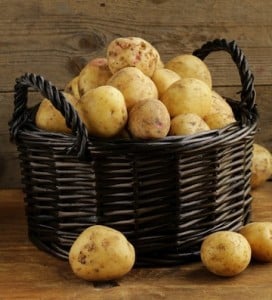 If you have marinara, pasta, olive oil, and spices on hand, it is much less tempting to spend more money ordering in or eating out. There are some things that I always have on hand* so I can always make a simple but delicious meal: whole grains (like rice and quinoa), vermicelli noodles, tomato sauce, chickpeas, frozen peas and corn, and some long-lasting produce like onions, garlic, ginger and potatoes. Sounds like the makings of a yummy veggie chili to me!
If you have marinara, pasta, olive oil, and spices on hand, it is much less tempting to spend more money ordering in or eating out. There are some things that I always have on hand* so I can always make a simple but delicious meal: whole grains (like rice and quinoa), vermicelli noodles, tomato sauce, chickpeas, frozen peas and corn, and some long-lasting produce like onions, garlic, ginger and potatoes. Sounds like the makings of a yummy veggie chili to me!
- Explore VegKitchen’s other Green Kitchen articles, as well as the wealth of kitchen tips in the entire Healthy Vegan Kitchen area.


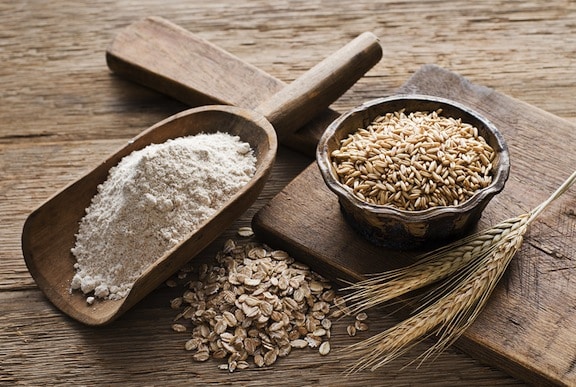
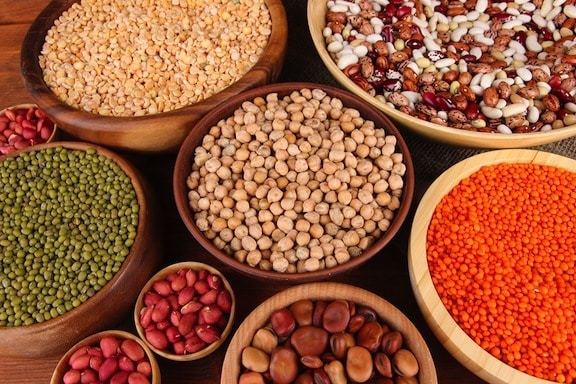
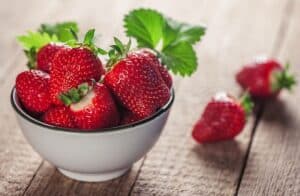
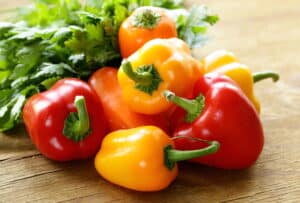
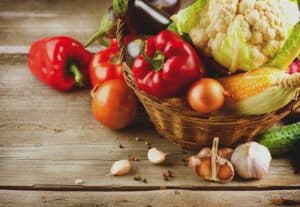
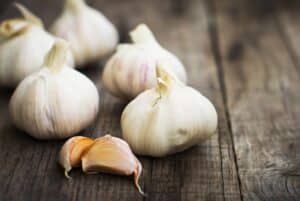
orthohawk says
I don't know what those people who say going vegan is too expensive are eating! I went on disability 3 years ago (with an attendant 2/3 cut in my monthly income!) and have found that a vegan diet is the only way I'm able to keep myself properly fed. Sure there is sometimes money to splurge (which usually means some kind of dairy) and the local food bank helps (mostly with bread), but most of the time it's some kind of beans and grains with veggies for me.
Nava says
Thanks for your thoughtful comment. It's good get confirmation of how economical a vegan diet can be!
Tonya says
I, too, spend far less when I eat vegan. I can't imagine how people can eat meat (I gave it up and when I look at it now, I think, "Who can afford to eat this????"
I think once certainly CAN spend more eating vegan but that's because they are buying highly processed crap foods.
I think too people look at non dairy milks and feel like that is an indicator of vegan vs non-vegan eating, $3.29 for half a gallon of non-dairy milk vs $4.36 a gallon for dairy milk. But that's an exception that proves the rule I think!
Excellent post!
Nava says
Thanks so much for your input, Tonya!
Mark says
I moved from lacto vegetarian to vegan at the beginning of last year, and living in Colombia where vegetarianism and veganism are not that common, means that I tend to make a lot of my own food. Certainly pre-made foods are more expensive and at times exorbitant, especially non dairy milks, but I think there are two other problems. One is that these days many people work so hard that they don't have time to cook their own food which is one of the biggest cost savers, and the other is that many people don't know how to cook or don't enjoy it. I am lucky because I have enough free time and I love cooking, but that's not the case for many people. All the best, Mark
Nava says
Thanks for your thoughts, Mark!
Linda Certuche says
People who say that vegan is too expensive don't mind spending $4 for a bag of potato chips but won't spend the same $4 on 10 pounds of potatoes. Also, speaking of nondairy milk. I make mine from rice or rolled oats. It doesn't have calcium but if your diet is rich in beans and greens it shouldn't matter.
Susan says
I don't understand people. Meat is so expensive and beans & rice are sooo inexpensive. People just don't like to change and don't want anyone else to right along with them. This isn't always the case of course, but it seems to be true quiet often I find. Thanks for your post. I'm going to look into cooking dry beans in a slow cooker to save even more money over the canned beans.
Mandi says
For you people who are busy at work and don't have time to cook, like myself, on your day off, cook up several batches of different beans. let them cool and store them, two cups per freezer bag, in your freezer. same thing with cooked rice. Also when you find those amazing deals on bell peppers, onions, mushrooms, etc, chop them up and put them on a cookie sheet layered with wax paper. freeze them for an hour or so then put them into freezer bags. I think saving money on vegan food is all about prepping for the week or two ahead. This way you don't have to do much after a hard day. just take frozen prepared produce and beans out of the fridge, dump the desired amount into a skillet, mix it up with some rice, noodles or what not and there ya go! dinner can be done in 20 minutes!!!
Nava says
Thanks for these great tips, Mandi!
Guy says
I came to your website looking for information because I'm thinking about elimination of animal products from my diet, the reason I have the impression vegan foods are expensive are because I see a premium being charged for vegan foods such as smoothies and because I see all these vegan cheeses and vegan milks and highly processed vegan foods which really turn me off veganism and seem very expensive, the information I really want is how to eliminate animal products without resorting to some elitist boutique lifestyle where a drink out costs 8-11 $ etc, thanks for the information.
Llinos says
Thanks for this. Really useful!